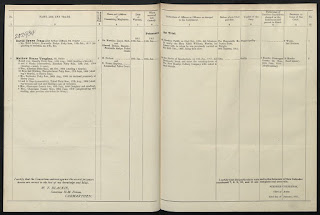The battle for
Crete started on the 20th May with the early morning waves of
airborne landings[1].
This
is my story, this is my song,
We’ve
been on this island too blooming long.
When
we came here “Old Crete” to defend,
We
hadn’t the faintest how it would end.
Another
withdrawal, strategic retreat,
Our
Officers leading the race to the fleet.
And
just as they left us at Spakhia Bay,
They
gave us this message while they sailed away.
Now
Boys do not panic, things will turn out alright,
The
Navy will come back, on Sunday night.
But
they needn’t have worried, ‘Jerry knew of our plan,
And
by noon on the Sunday, had got each single man.
Now
here we all are, right in the mire
Studying
the Germans, from behind the barbed wire.
The
‘Jerry’ is busy, or so they say,
Over
in Europe, keeping Russia away.
Here
is a new one; it’s just come to hand,
Were
being “repatted” to Old Gyppo Land.
It
can’t be too soon, don’t delay it too long,
And
fulfil the wish of this Prison Song[5].
While Sidney was
a prisoner on Crete he got on with the German guards, and when he mentioned
this at a meeting after the war in Skipton, he shocked those who were
there. Sidney found that some of the
Germans guarding the prisoners were Austrians who were part of the Alpine Force
and they enjoyed climbing and football so they had things to talk about.
The first
Sidney’s family knew that he was missing was on the 21st July 1941
when they received a letter from the War Office stating that Sidney was posted
as “missing” on the 2nd June.
As soon as Sidney could he wrote the following postcard to his family on
the 25th June.
Dear All,
I am a prisoner of war in German Custody.
I am unwounded and quite well. Please do not write to me until you hear from me again as I am at present only in a Transit Camp.
[1]
Antony Beevor, Crete: The Battle and the
Resistance, (London, 1991) p.102
[2]
Interview with Sidney Waterfall, c.2002
[3]
Antony Beevor, Crete; p.218
[4]
Antony Beevor, Crete; p.226
[5]
Personal
Papers of Sidney Waterfall
.jpg)


Comments
Post a Comment